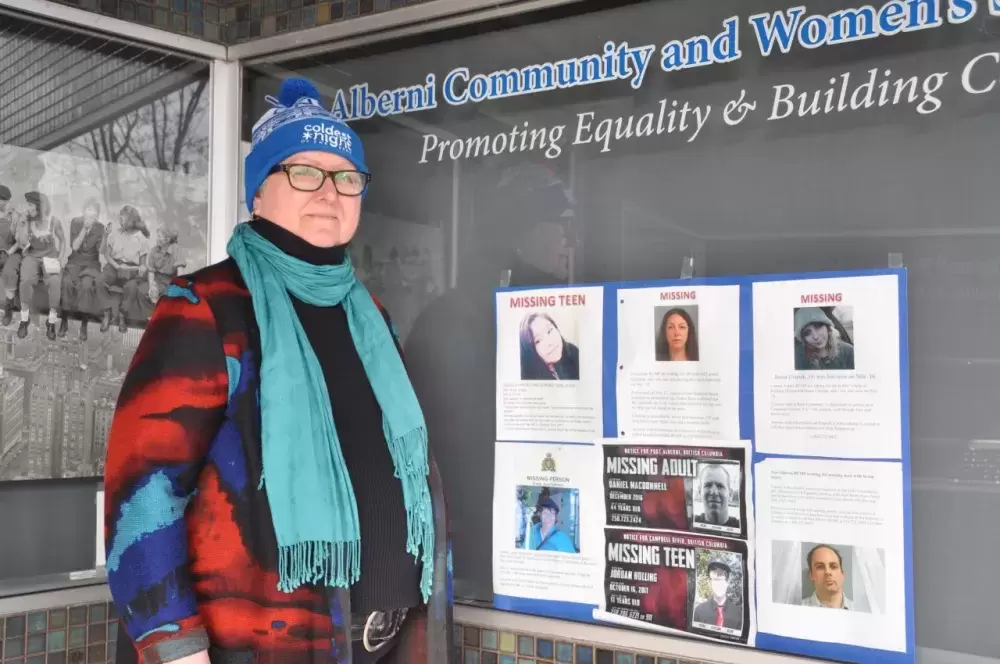The Alberni Community and Women’s Services Society is inviting the community to join them for the Coldest Night of the Year on Saturday, Feb. 23.
There are CNOY events taking place right across Canada, and the focus is on raising money to combat homelessness in our communities. In Port Alberni, participants will gather at the Athletic Hall (3727 Roger St.) at 4 p.m., and may take part in a 2-K, 5-K or 10-K hike on a safe, specified route.
“There are over 125 communities across Canada that do Coldest Night of the Year,” ACAWS executive director Ellen Frood told Ha-Shilth-Sa.
While Port Alberni’s chill won’t match Winnipeg, for example, “It is symbolic when we talk about ‘Coldest Night of the Year,’ and what we support – and that is our kids,” she added.
Frood said ACAWS takes the CNOY focus beyond homelessness and into the full range of interconnected social problems that affect children and families. The society operates a transition house to give abused women and their children a temporary home, as well as an on-site Drop-In Centre at their Third Avenue office.
“We have an open door and a pot full of coffee and somebody always brings muffins,” said Frood. “It is a place where you can come for referral services, information, or you can just sit. We have mittens, gloves, hats, socks, personal care needs. We distribute harm reduction supplies – all of our staff are trained to administer Naloxone (in the event of opiod overdose)… people will come to us to replenish their kits.”
At the Drop-In Centre, clients can also meet with a community-based Victim Services worker and, if required, meet with RCMP and initiate court action. There are also programs for children who have witnessed abuse or have suffered sexual abuse, along with outreach services in the schools.
“So somebody may drop in to our centre to get out of the cold, and we are able to refer them to services that are available,” said Frood.
Wes Hewitt is the executive director of the Port Alberni Shelter Society, which keeps track of the homeless population in the community.
“Our last PIT (point-in-time) count in April [2018] put us at 147 for that day,” Hewitt said, adding that a PIT is performed over a 24-hour period by observers on the street. It is not necessarily a number to be trusted.
“Realistically, we’re probably looking at 200 to 250 people at any given time,” he said. And there is not a lot of seasonal variation, he noted. Of the homeless population, Hewitt said about 40 per cent are Indigenous people.
“We are much higher than what we should be in the [Indigenous] community,” he said. “Demographically, we are about 19 per cent [Indigenous]. So we are badly over-represented in that group.”
Hewitt said that anyone looking back at the toxic legacies that have affected B.C. First Nations, including the residential school history, can understand the social stresses and vulnerabilities they face on a day-to-day basis. Homelessness is just part of the problem.
“For that reason, I would like to commend the Nuu-chah-nulth Tribal Council and the First Nations Health Authority for doing something – they see the issues and they are trying to address them.”
As an aside, Hewitt observed that services for the non-Indigenous homeless community are not adequate, either.
“We should not be focusing just on substance abuse and mental health. We also have to look at affordability,” he said. “It is a huge issue in this community.”
CNOY 2019 will see a variety of teams participating, as well as individuals. After completing their hikes on Saturday night, CNOY participants will gather at the Athletic Hall.
“Once people come back, we give them a big chili dinner as a thank-you,” Frood said. This year, we have Teens Can Rock, providing entertainment. And the Elite Dance Studio have some of their people coming out. We’re also having a silent auction to raise money and awareness.”
Frood said the very format of CNOY – having all those people out on the street – creates awareness.
“Especially if they’re all wearing their Coldest Night of the year blue hats,” she added.
The event will require plenty of volunteers – welcoming people, directing foot traffic, preparing food, etc. There is still time to sign up online (cnoy.org) or call Carol Hansen at ACAWS: 250-724-7111 ext 221.







